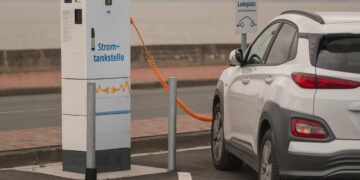Electric Cars and Environmental Impact: Unveiling the Eco-Friendly Truth
As the world grapples with climate change and environmental degradation, electric cars (EVs) are often promoted as a significant part of the solution. But just how effective are electric vehicles in reducing environmental impacts compared to conventional gasoline-powered cars?
Understanding the Environmental Benefits of Electric Cars
The primary environmental benefits of electric vehicles are well documented. Unlike combustion engine vehicles, EVs produce no direct exhaust emissions. This means no carbon dioxide (CO2), no nitrogen oxides (NOx), and no volatile organic compounds (VOCs) emanating from the tailpipe. This feature makes them an appealing option for reducing urban pollution and improving air quality in densely populated areas.
Reduced Greenhouse Gas Emissions
Electric cars contribute to a lower overall carbon footprint. Although the production of EVs, especially batteries, can be resource-intensive, the total emissions over the lifespan of an electric car are typically lower than those of internal combustion engines (ICE) vehicles. This advantage is increasingly amplified as more renewable energy sources like wind and solar are used to power the electrical grid.
Energy Efficiency
EVs convert over 60% of the electrical energy from the grid to power at the wheels — far greater efficiency than the roughly 20% efficiency of gasoline-powered vehicles. This increased energy efficiency translates into better environmental performance in regions where electricity production is relatively clean.
Life Cycle Analysis and the Critics’ Point
While EVs offer significant in-use benefits, critics point to the life cycle impact of electric vehicles, focusing particularly on battery production. Producing batteries for EVs is energy-intensive and involves materials like lithium, cobalt, and nickel. Mining these materials raises concerns regarding ecological degradation and the carbon footprint generated from these activities.
Battery Recycling: Tackling the Disposal Problem
The environmental impact of disposing of EV batteries is a critical issue. However, advancements in recycling processes are gradually reducing the negative impact. Companies are developing more efficient methods of reclaiming materials from spent batteries, thus mitigating the environmental damage associated with disposal.
Evaluating Production Footprints
The production process of electric vehicles, notably the battery, does contribute to environmental impacts. However, ongoing technological improvements are reducing these effects. Manufacturers are engaging in more sustainable production practices, minimizing waste, and increasingly sourcing electricity from renewable resources during production.
The Bigger Picture: Electric Vehicles and Renewable Energy
Electric cars offer the possibility of reducing our ecological impact dramatically when combined with renewable energy sources. As the grid becomes greener, the overall environmental impact of driving an EV decreases. This synergy between EVs and renewable energy sources is crucial for achieving long-term sustainability goals.
Policy and Infrastructure Development
To maximize the environmental benefits of electric cars, supportive policies and infrastructure development are essential. Governments and private sectors are working to enhance the availability of charging stations, which not only increases the convenience of using EVs but also encourages more people to transition from gasoline cars.
Conclusion: The Path Forward with Electric Vehicles
While electric vehicles are not a perfect solution, their potential for reducing environmental impact is undeniable. Advancements in battery technology, improved recycling methods, supportive policies, and a cleaner electricity grid will continue to enhance the sustainability profile of EVs.
In conclusion, transitioning to electric cars offers a promising pathway towards more sustainable transportation, essential for mitigating climate change and enhancing public health. By addressing the production and disposal challenges, electric vehicles can represent a significant step forward in our journey towards a cleaner, more sustainable future.









